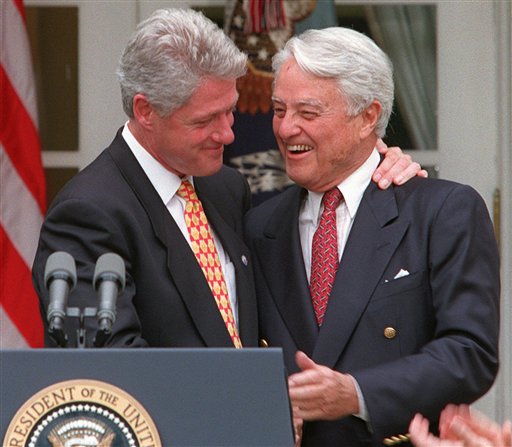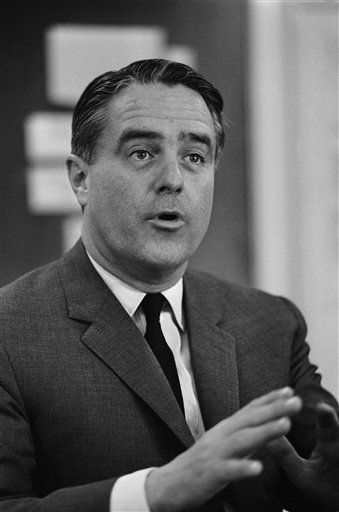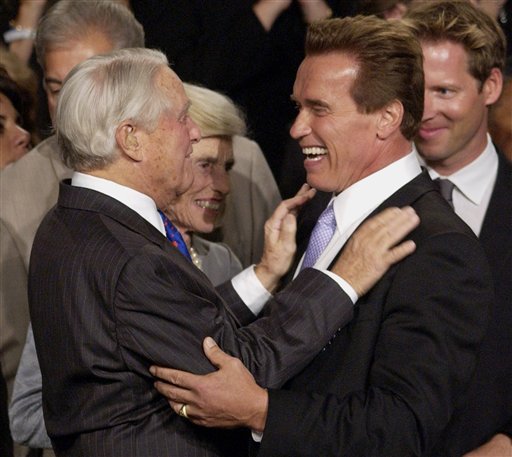First Peace Corps head Sargent Shriver dies at 95

In this June 19, 1996 file photo, President Clinton embraces R. Sargent Shriver in the Rose Garden of the White House Wednesday June 19, 1996 during a ceremony to honor the 35th anniversary of the Peace Corps. Shriver was named the first director of the Peace Corps by President John F. Kennedy. Shriver, the exuberant public servant and Kennedy in-law whose singular career included directing the Peace Corps, fighting the "War on Poverty" and, less successfully, running for office, died Tuesday, Jan. 18, 2011. He was 95. (AP Photo/Ruth Fremson, File)

This March 20, 1964 file photo shows R. Sargent Shriver speaking during an interview in Washington. Shriver, the exuberant public servant and Kennedy in-law whose singular career included directing the Peace Corps, fighting the "War on Poverty" and, less successfully, running for office, died Tuesday, Jan. 18, 2011. He was 95. (AP Photo/Henry Burroughs, File)

This Oct. 7, 2003 file photo shows Arnold Schwarzenegger, right, being congratulated by his father-in-law R. Sargent Shriver after Schwarzenegger declared victory in the California gubernatorial recall election at his election night headquarters in Los Angeles. Shriver, the exuberant public servant and Kennedy in-law whose singular career included directing the Peace Corps, fighting the "War on Poverty" and, less successfully, running for office, died Tuesday, Jan. 18, 2011. He was 95. (AP Photo/Mark J. Terrill, File)



BETHESDA, Md. — R. Sargent Shriver, the Kennedy in-law whose career included directing the Peace Corps, fighting the War on Poverty and, less successfully, running for office, died Tuesday. He was 95.
Shriver, who announced in 2003 that he had Alzheimer’s disease, had been hospitalized for several days. The family said he died surrounded by those he loved.
His death came less than two years after his wife, Special Olympics founder Eunice Kennedy Shriver, who died Aug. 11, 2009, at age 88. The Kennedy family suffered a second blow that same month when Sen. Edward Kennedy died.
Speaking outside Suburban Hospital in Maryland, Anthony Kennedy Shriver, said his father was "with my mom now," and called his parents’ marriage a great love story.
At Eunice Shriver’s memorial service, their daughter Maria Shriver said her father let her mother "rip and he let her roar, and he loved everything about her." He attended in a wheelchair.
The handsome Shriver was often known first as an in-law — brother-in-law of President John F. Kennedy and, late in life, father-in-law of California Gov. Arnold Schwarzenegger.
Don't miss out on what's happening!
Stay in touch with breaking news, as it happens, conveniently in your email inbox. It's FREE!
But his achievements were historic in their own right and changed millions of lives: the Peace Corps’ first director and the leader of President Lyndon Johnson’s "War on Poverty," out of which came such programs as Head Start and Legal Services.
President Barack Obama called Shriver "one of the brightest lights of the greatest generation."
"Over the course of his long and distinguished career, Sarge came to embody the idea of public service," Obama said in a statement.
Within the family, Shriver was sometimes relied upon for the hardest tasks. When Jacqueline Kennedy needed the funeral arranged for her assassinated husband, she asked her brother-in-law.
"He was a man of giant love, energy, enthusiasm, and commitment," the Shriver family said in a statement. "He lived to make the world a more joyful, faithful, and compassionate place. He centered everything on his faith and his family. He worked on stages both large and small but in the end, he will be best known for his love of others. "
In public, Shriver spoke warmly of his famous in-laws, but the private relationship was often tense. As noted in Scott Stossel’s "Sarge," an authorized 2004 biography, he was a faithful man amid a clan of womanizers, a sometimes giddy idealist labeled "the house Communist" by the family. His willingness to work for Johnson was seen as betrayal by some family members.
The Kennedys granted him power, but also withheld it. He had considered running for governor of Illinois in 1960, only to be told the family needed his help for John Kennedy’s presidential campaign. Hubert Humphrey considered him for running mate in the 1968 election, but resistance from the Kennedys helped persuade Humphrey to change his mind.
When Shriver finally became a candidate, the results were disastrous: He was George McGovern’s running mate in the 1972 election, but the Democrats lost in a landslide to President Richard M. Nixon.
Four years later, Shriver’s presidential campaign ended quickly, overrun by a then-little-known Georgia governor named Jimmy Carter.
Although known for his Kennedy connections, Shriver, born in 1915, came from a prominent old Maryland family. His father was a stockbroker, but he lost most of his money in the crash of 1929.
Shriver went on a scholarship to Yale, then went on to Yale Law School. He served in the Navy in the Pacific during World War II.
Returning home, he became an assistant editor at Newsweek magazine. About this time, too, he met Eunice Kennedy and was immediately taken by her. They married in 1953 in New York’s St. Patrick’s Cathedral.
Her father, Joseph P. Kennedy, hired him to manage the Kennedy-owned Merchandise Mart in Chicago. He was a big success on the job and in Chicago in general — and even was elected head of the school board in 1955.
Shriver had fought for integration in Chicago and helped persuade John F. Kennedy to make a crucial decision in the 1960 campaign despite other staffers’ fears of a white backlash: When the Rev. Martin Luther King Jr. was jailed in Georgia that fall, Kennedy phoned King’s wife and offered support. His gesture was deeply appreciated by King’s family and brought the candidate crucial support.
Soon after taking office, Kennedy named Shriver to fulfill a campaign promise to start the Peace Corps. Although it was belittled by some as a "kiddie corps," Shriver quickly built the agency into an international institution.
After Kennedy’s assassination, in 1963, Johnson called upon Shriver to run another program which then existed only as a high-minded concept: the War on Poverty.
Shriver’s efforts demonstrated both the reach and frustrations of government programs: Head Start remains respected for offering early education for poor children, and Legal Services gave the poor an opportunity for better representation in court.
But other Shriver initiatives suffered from bureaucracy, feuds with local officials and a struggle for funds as Johnson devoted more and more money to the Vietnam War.
In early 1968, with Shriver rumored to be on the verge of quitting, Johnson offered him the ambassadorship to France. He accepted it even though some family members wanted Shriver to support Sen. Robert Kennedy’s presidential candidacy instead.
In Paris, Shriver won many French fans, but he left the post for a job in private business not long after Nixon took office in 1969.
He campaigned for congressional Democrats in 1970, and two years later McGovern drafted him to replace Sen. Thomas Eagleton of Missouri as his running-mate. Eagleton dropped out because of questions about his medical history.
Shriver was good humored that he had been McGovern’s seventh pick for the job — after brother-in-law Ted Kennedy, among others. He named his campaign plane "Lucky 7."
In September 1975, Shriver joined an already crowded race for the 1976 Democratic nomination. But he dropped out in March 1976 after poor showings in the early primaries and never again sought office. He instead worked with Special Olympics and other causes.
In 1994, Shriver received the Presidential Medal of Freedom, the nation’s highest civilian honor, from President Bill Clinton.
Meanwhile, daughter Maria Shriver gained fame as an NBC newswoman and, since 2003, first lady of California. The Shrivers also had four sons — Robert, Timothy, Mark and Paul Anthony. Mark Shriver was elected to the Maryland House of Delegates in 1995 and ran unsuccessfully for Congress in 2002. They also had 19 grandchildren.



